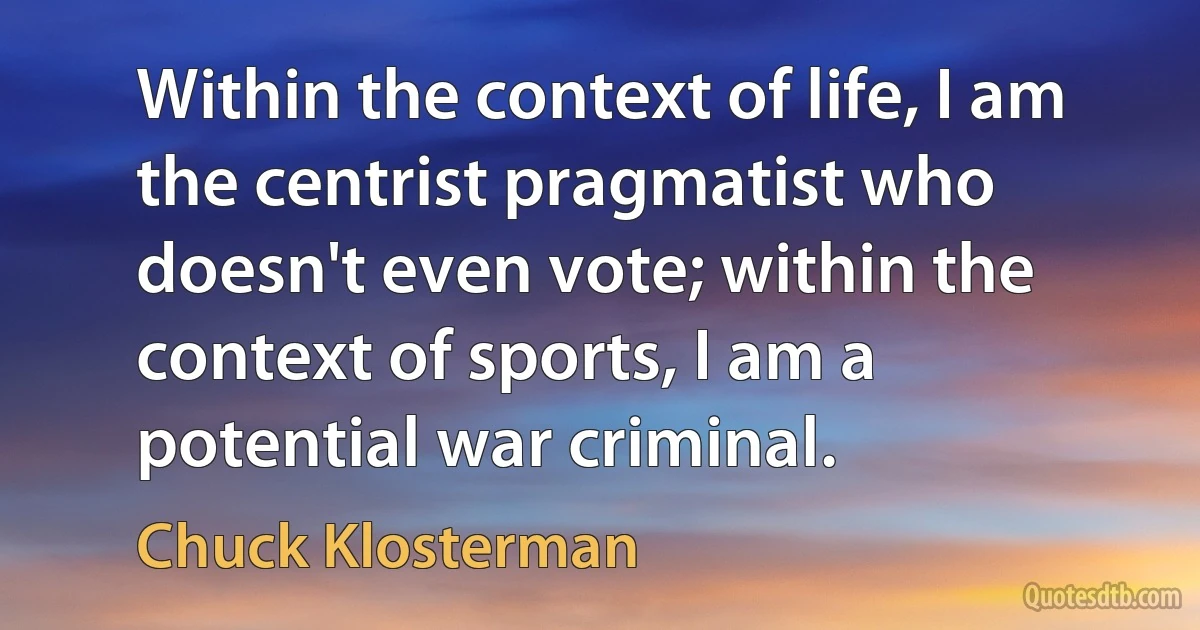Pragmatist Quotes
There continue to be complex debates about what Nietzsche understood truth to be. Quite certainly, he did not think, in pragmatist spirit, that beliefs are true if they serve our interests or welfare: we have just seen some of his repeated denials of this idea. The more recently fashionable view is that he was the first of the deniers, thinking that there is no such thing as truth, or that truth is what anyone thinks it is, or that it is a boring category that we can do without. This is also wrong, and more deeply so. Nietzsche did not think that the ideal of truthfulness went into retirement when its metaphysical origins were discovered, and he did not suppose, either, that truthfulness could be detached from a concern for the truth. Truthfulness as an ideal retains its power, and so far from his seeing truth as dispensable or malleable, his main question is how it can be made bearable.

Bernard Williams
No such luck. " He smiles. "For better or for worse, I don't have that kind of power. If I sound like I'm always predicting ominous things, it's because I'm a pragmatist. I use deductive reasoning to generalize, and I suppose this sometimes winds up sounding like unlucky prophecies. You know why? Because reality's just the accumulation of ominous prophecies come to life. All you have to do is open a newspaper on any given day and weigh the good news versus the bad news, and you'll see what I mean.

Haruki Murakami
The one version of the bourgeois comprises the artisan, the trader, the official, the financier, and the entrepreneur, all of whom, in their own way, can claim to know what labor is. Juxtaposed to them from the beginning, stands a type of bourgeois who does research, writes poetry, composes and makes music, and philosophizes and who believes that these activities develop a world that is self-sufficient. It is obvious that these two fractions of the bourgeois ego get on only superficially and come together only in the hollow connection of property and cultivation. They create the century-long tension between the good and the evil bourgeois, the idealist and the exploiter, the visionary and the pragmatist, the ideally liberated bourgeois and the laboring bourgeois. This tension remains as inexhaustible as that between the world of work and "freedom” in general.

Peter Sloterdijk
No matter how long the tyrant endures, he will be the loser at the end. Your thought differentiates between pragmatist and idealist, between the part and the whole, between the mystic and materialist. Mine realizes that life is one and its weights, measures and tables do not coincide with your weights, measures and tables. He whom you suppose an idealist may be a practical man.

Kahlil Gibran
To say that I did not support the candidacy of Mr. Trump is the understatement of the year. I fiercely opposed it... I have criticized as unnecessary his policy on pausing immigration from certain countries, and I have criticized as weak to the point of meaningless his executive order on religious freedom. Indeed, I characterized it as a betrayal of his promise to reverse Obama era anti-religious-liberty policies. Donald Trump is not, and usually doesn't pretend to be, a man of strict or high principles... As a pragmatist, he doesn't have a governing philosophy - he's neither a conservative nor a liberal. On one day he'll give a speech to some evangelical pastors that makes him sound like a religious conservative, but the next day he'll lavishly praise Canadian Prime Minister Justin Trudeau, who is waging an all-out war on those who stand up for traditional moral values in Canada.

Robert P. George


